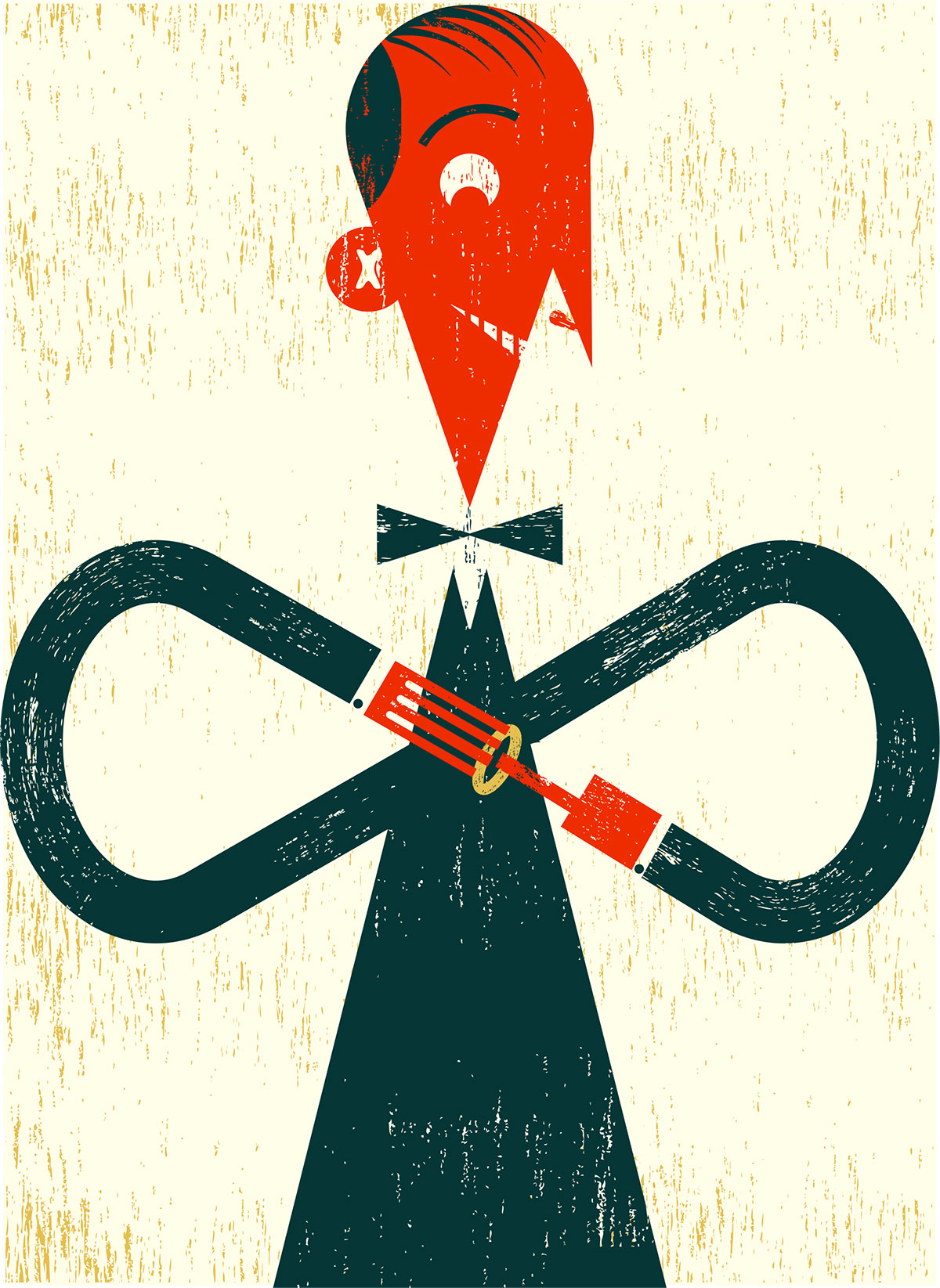
In my country, two men often marry. Two women also. And these people are happy or not, in the manner of any marriage or of any couple throughout the world or time.
And so the time came for me, when I, too, was seized with the desire to marry. But I wanted something closer than holly and ivy, closer than two sprigs of holly, or two vines of ivy. Something closer than bread and toast. Something more like breathing.
So I married myself.
Marriage is like a Möbius strip, a twisting, turning thing that appears to have two sides, but, in reality, has only one. Or that appears to have only a single side, but in truth has two. It’s the edges that are important. It’s the edges that are often forgotten.
It was a beautiful day. There was music. In the man-made glade, there was a flute and a harp. Or two harps. Or a single flute. There was a rabbi. A single rabbi with a snow-cloud beard like Santa Claus. There were piles of food and an ice sculpture in the shape of God and Adam pointing at each other from the ceiling of the Sistine Chapel. In the middle of the boundless sweet table, there was a three-tiered wedding cake, and at its summit, under a little icing-sugar chuppah, a single person in a black tuxedo. This, in the language of celebration and the alchemy of cake-decoration, was me. After the traditional ceremony on the stage of the lovely country chapel, I embraced myself and cried as I promised to be true to this life before God, my parents, my friends, and myself. Then I stomped on the wine glass and the people broke into song.
My love was not absolute, for life is changeable, uncertain, a minefield of betrayals and tragedy. But I had faith. I had the courage of my promise. I would forever be true to this love, whether it flickered or shone bright. Whether it was a candle or a Klieg light. Whether it was a Klimt or a Sigmund Freud. My love for myself would deepen with time. There would be therapy, counselling, and walks by the sea as the sun set. I thought how the sand was like the ripples I felt as I touched my tongue to the roof of my mouth and explored.
I gave myself pleasure, laughed at my own jokes. Sometimes, I knew what I was thinking; sometimes, I did not. After a while, it became more difficult to surprise myself, but I managed. I was a man of routine, but then, without warning, I would change. I’d find myself across town eating somewhere new, trying something different. Is this sea cucumber? I’ve never had sea cucumber. I’d take in the ballet or a ball game. Sometimes within an hour of one another. I would add spice to things that never had spice. I would dress in the dark, only open my eyes downstairs before the mirror. I would write notes to myself without looking. I learned to speak without first thinking, learned to anticipate my every need. I appreciated the little things. Is that a new tie? I can’t believe what you managed on that triple-word score.
I filled my house with mirrors so I was surrounded by love. In some places where there were two mirrors, it seemed that there were an infinite number of marriages, my life a Ziegfeld Folly down a connubial corridor, a blissful kaleidoscope of spouses waving at each other, looking out with endless pairs of eyes into the same happy and domestic world.
There were years of happiness. Holidays. Promotions. Birthdays. Good times, with friends and alone. A new house. A cottage by the sea. Late night drives out into the country, nothing but the stars, the empty fields, and thoughts intertwined with the quiet songs of the radio. Sunday morning coffee on the porch or in bed. Dreams shared. The prosody of reality scanned. New family. Crises met, averted, or suffered.
I was taken by surprise when the news came, though I had not been feeling well and had been taking it easy, pacing myself, spending more time at home, and at rest. But still, I was young. I felt strong, and there was much to do, much to look forward to. Soon it would be spring. There was gardening. The crocuses had bloomed between the mess of dried stalks in last year’s gardens. A niece and a nephew were learning to roll over, to walk, beginning to name things, to delight in their new discoveries. My parents had become warm and sentimental, feeling joy and satisfaction in their family and each other, now having time to deeply experience each small trouble or accomplishment. And my marriage. I looked forward to an old-age marriage: of cups of tea carefully carried to the bedside, of memories dim yet strongly felt, of fastidious preparation on the calendar for each minor outing or appointment.
The doctor said there was not much time. Maybe a month. Maybe only two weeks. I thought back to the day of my wedding. I don’t know why but I remembered the stains on the waiters’ white jackets, the cloying questions of the videographer, my brother’s bad jokes, the beautiful lithe body of an old friend from college, and my own young self. There was the future like the inconceivably long flight path of a migrating bird. A path stretched out before endless generations of birds. Each bird could not conceive of the distance of its destination or of the vastness of its route, but knew only the winds, the position of the stars, and some kind of deep pull from far inside its brain.
At the end, I sat myself up in the wheelchair and waited. The nurse had helped me dress and shave. I had brushed my hair carefully and put on cologne. I was as handsome as I’d ever been.